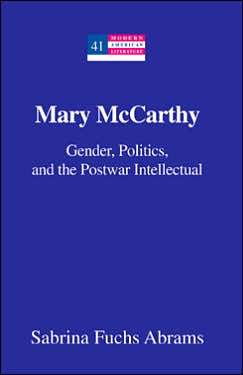

 |

|

The average rating for Mary McCarthy based on 2 reviews is 3.5 stars.
Review # 1 was written on 2007-11-20 00:00:00 Martin Roman Martin RomanAlso very useful for my research. |
Review # 2 was written on 2008-05-14 00:00:00 Kenneth Willman Kenneth Willman"The Homestead Act lies behind the journeys and homes in [the series]...The books seldom directly criticize the Homestead Act. One criticism does appear, however... Whoever makes these laws ought to know that a man that's got enough money to farm, has got enough to buy a farm. If he hasn't the money, he's got to earn it, so why do they make a law that he's got to stay on a claim when he can't? All it means is, his wife and family have got to sit idle on it, to buy the tools and seeds, if somebody didn't have to sit on this claim." pp. 6-7 "Their one ideal was freedom--from government, Native Americans, wolves, or any interference in their private affairs. They were fiercely independent and yet curiously dependent on and cooperative with one another." pg. 9 "Here she [Moore] credits Lane with the necessary "objectivity" and "craft" and Wilder with the "life and perspective" and concludes that "the real chemistry of the collaboration escapes definition and lies somewhere in the realm of psychological reality which never got onto the paper and remains forever beyond our grasp." Anderson was the next to probe the nature of the collaboration, carefully detailing Wilder's "literary apprenticeship"...Lane also played an extensive role in the creation of the book about her father's childhood...perhaps an even greater role than for Little House in the Big Woods...Anderson's contention is that Wilder was a storyteller who learned from her daughter the craft of transforming her material into writing...taking a stronger hand in the crafting of her own books." "Fellman argues that Lane's unhealthy relationship with her mother while working on these books taught her to be a "hard right" conservative, emphasizing the presumably American virtues of self-reliance, ingenuity, emotional stoicism, freedom, and responsibility---and therefore little government." pp. 30-31 "The attention to detail is...an emotional refuge, ...[capturing] a child's ability to ease anxiety by losing herself in the contemplation of the orderly and ordinary." pg. 35 "Attention is, interestingly enough, a religious idea in more than one tradition. Zen Buddhism, for example, enjoins a state of mindfulness, an open attention to whatever is at hand; but Zen practitioners know this is always threatened by distraction. Mindfulness is valued because it is a full waking up from the darkness of illusion and a full recognition of reality as it is..Bellah and his colleagues...assert that self-control and self-discipline are essential to genuine attentiveness and can be learned only from others--in the first place from family." pg. 36 "Both, extreme constriction and all-filling vastness, suck in or swallow the fragile ego." "Ma says, "Now we're living like civilized folks again", identifying the house as a symbol of civilization in contrast to the wild prairie." pg. 40 "If prejudiced, though, she is also gentle, quiet, and steadfast. Determined to teach Mary and Laura their proper gender role, she reveals the strength and force of the pioneer woman as the civilizer of the frontier. She is one of the many images of the frontier woman who, as a sturdy helpmate for her husband, was known as "The Madonna of the Prairie, the Brave Pioneer Mother, or the Gentle Tamer." pg. 46 "Watt confirms the mystics experience. We are not separate. Reality is one. The notion of two or three or many is a convention of language, thought, and memory. Furthermore, reality is always unknown, always changing, always dying and being born each moment, and always all there is--that is, eternal. Whatever we call our experience--God, the sacred, the divine, ultimate reality, the ground of being--it is one and beyond words, thoughts, or memories. It is always the present, eternal moment." "Fear, suffering, and denial result from living in our heads and mistaking our thoughts and memories for reality." Pp. 76-77 "All pint out that loveliness, joy, liveliness, love, creativity, challenges, and the blessings of life exist precisely because life is insecure, imperfect, and impermanent. Paradoxically, it is when we let go and are mindful of the moment that we become complete and secure. We experience the wisdom of in society and the blessings of imperfection--what the Buddhists call "enlightenment." Pg. 78 "She has internalized the values initially expressed in her portraits of little houses and wilderness [internal motivation v.external compulsion.] Her society and freedom exist within. They are part of her identity." Pg. 97 "What MacLeod calls the "Caddie Woodlawn syndrome" controls this writing...many American families allowed their little girls to live nearly as unfettered and vigorous an outdoor life as their brothers. Country children, in particular, roamed their world without much restriction...Laura--like Caddie--discovers at puberty that the price of her freedom "is accepting greater restrictions on her freedom and higher standards for her behavior" than are required of men." Pg. 100 "Given humanity's longstanding fear of wilderness and hostility toward it, Nash recognizes that "appreciation of wilderness is nothing less than revolutionary." Pg. 104 Pp: 110, |
CAN'T FIND WHAT YOU'RE LOOKING FOR? CLICK HERE!!!